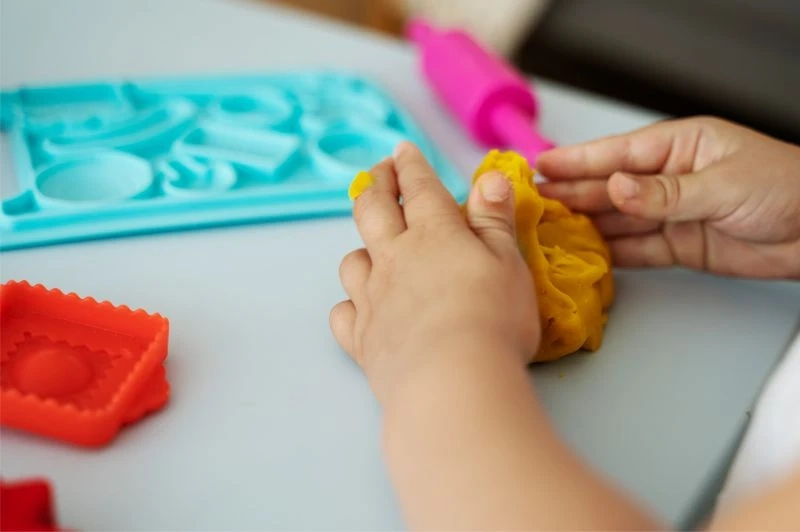Learning through sensory play is a valuable approach in preschool education as it engages children in hands-on activities that stimulate their senses and promote their cognitive, social, emotional, and physical development. The top primary school near Bansdroni recognizes the importance of sensory play and incorporates it into its curriculum.
Sensory play activities involve the use of materials that engage the senses such as sand, water, clay, playdough, paint, and other manipulatives. By exploring and experimenting with these materials, children develop their fine motor skills, hand-eye coordination, and spatial awareness. They also learn to observe, compare, and classify objects based on their properties such as colour, texture, size, and shape.
Moreover, sensory play provides opportunities for children to express their creativity, imagination, and emotions. They can use the materials to create their own designs, tell stories, or role-play scenarios. This enhances their language skills, social skills, and emotional intelligence as they interact with their peers and adults.
At the top primary school near Bansdroni, teachers incorporate sensory play activities into their lessons to reinforce learning objectives in various subjects such as science, math, language arts, and social studies. For example, children can use blocks or Legos to build structures to learn about geometry and spatial relationships. They can also use sensory bins filled with different objects to explore different themes such as ocean life, community helpers, or seasons.
Benefits of sensory play for children
Sensory play is an essential aspect of early childhood education, and it can benefit children in various ways. Here are some of the benefits of sensory play for children at the best preschool in Kolkata:
Development of fine motor skills: Sensory play involves activities such as squeezing, pinching, and grasping, which can help develop a child's fine motor skills. These skills are important for activities such as writing, drawing, and using utensils.
Improved cognitive development: Sensory play helps children to explore, experiment, and problem-solve, which can improve their cognitive development. They learn to observe and make connections between their actions and the outcomes.
Language development: Sensory play can also help with language development, as children are encouraged to communicate their observations and experiences with the materials they are playing with.
Increased creativity and imagination: Sensory play encourages children to use their creativity and imagination to explore the world around them, and to create their own stories and scenarios.
Reduced stress and anxiety: Sensory play can be calming and soothing, which can help children to reduce stress and anxiety.
At the best preschool in Kolkata, teachers create a variety of sensory play activities that are engaging, stimulating, and safe for children. Some examples include water play, sand play, painting with different textures, and playing with sensory bins filled with various materials such as rice, beans, or sand. Overall, sensory play is a valuable and enjoyable learning experience for young children, and it should be an integral part of early childhood education.
Sensory play activities
Sensory play is an essential part of early childhood development as it promotes exploration, discovery, and preschool learning through hands-on experiences. Here are some sensory play activities that can help preschoolers learn and grow:
Sensory bins: Create a sensory bin by filling a container with materials like sand, water, or rice. Add items like measuring cups, spoons, and funnels to encourage exploration and experimentation.
Playdough: Make homemade playdough using flour, salt, and water, and add colours and scents for added sensory stimulation. Encourage children to mould the dough into different shapes and objects.
Finger painting: Finger painting is a fun and messy way to explore colours and textures. Use non-toxic paint and let children create their own masterpieces.
Water play: Provide children with water tables, buckets, and cups for a fun and engaging water play experience. Add items like boats, sponges, and strainers to encourage exploration and learning.
Nature exploration: Take children on nature walks and encourage them to explore the environment using their senses. Ask questions like, "What do you hear?" or "What do you see?" to stimulate observation and critical thinking.
Sensory bottles: Create sensory bottles using water, oil, glitter, or other materials. Children can shake the bottles to explore cause and effect and learn about different materials and their properties.
Music and movement: Encourage children to explore rhythm and movement through music and dance. Provide instruments like drums and shakers for added sensory stimulation.
Overall, sensory play activities provide valuable preschool learning experiences for children and can help them develop important skills like critical thinking, creativity, and problem-solving.
Learning through sensory play is a valuable approach in preschool education that promotes children's holistic development. The top primary school near Bansdroni recognizes the importance of this approach and incorporates it into its curriculum to provide children with engaging and meaningful learning experiences.


